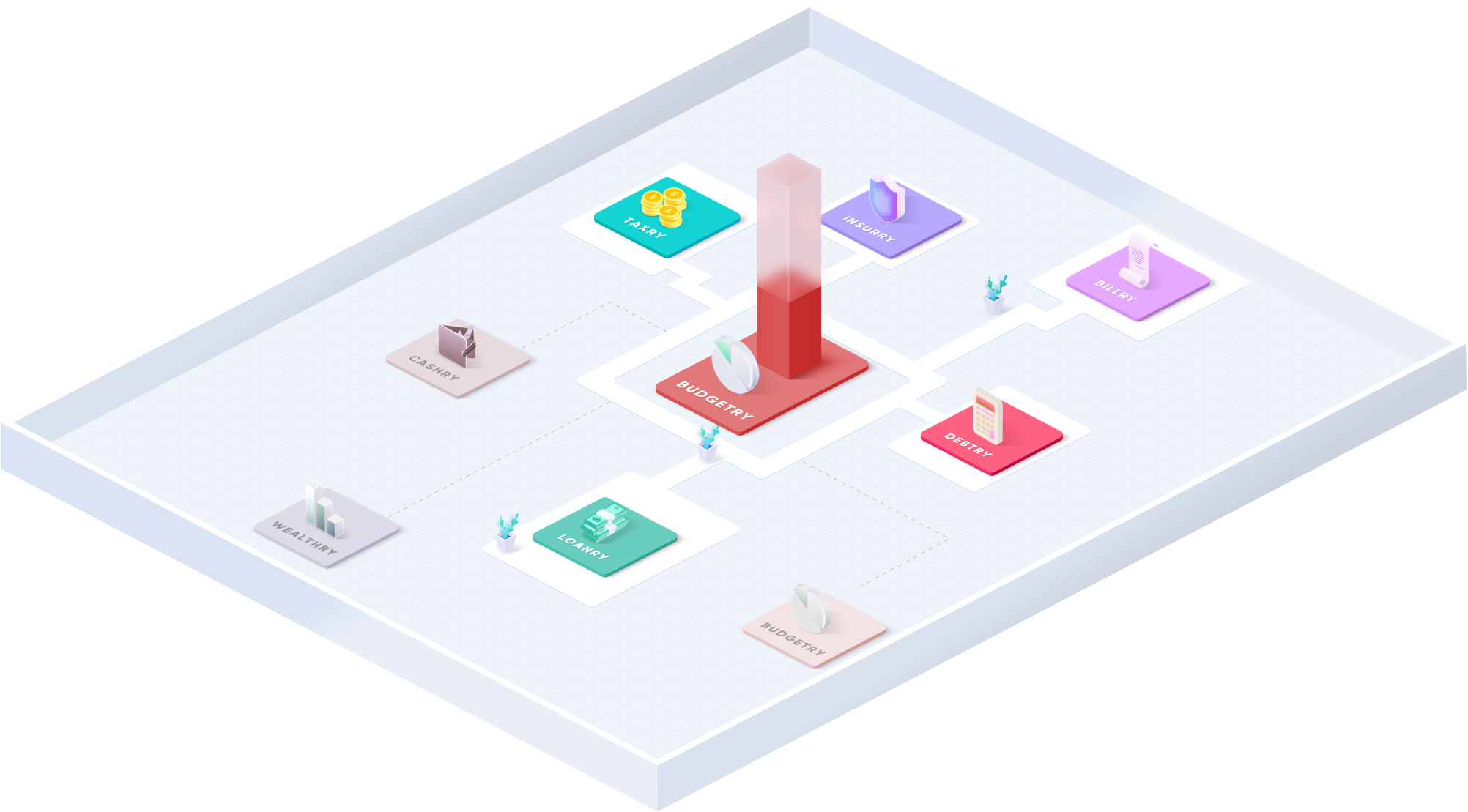


Our philosophy and Budgetry, and across the Goalry family, is simple. We believe that with the right information, access, connections, and tools, most of us are perfectly capable of taking more effective control of our personal or small business finances. Whether it’s building a budget, taking out a personal loan, or investing in the future, we believe in the power of unified finance to make personal and small business finances more understandable and more efficient.
If you found us because you need some ideas or help setting and sticking to personal budget goals, or you need a budget tracker, or you just want some fresh budget tips, that’s awesome – we’re glad you’re here. There’s plenty here for you to access right now, free of any sort of charge or obligation, and more coming soon. We’re glad you found your way to us, and we’d like to do whatever we can to help while you’re here.
Be aware, however, that taking advantage of the tools and information offered here at Budgetry gives you the same access to our sister sites and anything they have to offer as well. Information and options for checking your credit report, determining the real value of your real estate, understanding the ins and outs of refinancing a mortgage or financing a vehicle – it’s your call how much you use and when. That’s the whole idea of an online financial content mall, after all.
Feel free to look around, and let us know if we can help.

There are words that produce a reaction beyond what their definitions naturally justify. Some are loaded socially or politically – “liberal,” “conservative,” “freedom,” or “choice,” for example. Others come and go like musical tastes or shoe styles; we’re still hearing arguments about just how literally we should be using the word “literally.” You’d think that “diet” was some sort of torture device made possible by maniacal new technologies, when in reality everyone alive has one. Like the weather, it may change, but you can’t escape it altogether. It’s just a question of how intentional we are about it in practice, or whether or not its results are what we’d like.
“Budget” is like that. We’ve allowed it to take on personal and cultural baggage that the word itself doesn’t deserve. Most of us have some form of income; almost all of us have expenses. Money comes in and goes out whether we have a plan or not. A personal budget doesn’t shackle us or stop us from spending our own money however we choose; it’s actually quite the opposite. Making a budget reveals our choices and priorities to us and allows us to make better decisions about how we utilize our hard-earned resources. Following a few basic budget tips can make things easier for us – not harder.
If creating a budget sounds intimidating, it’s not because a monthly budget in some way limits our choices or tells us what we have to do; it’s because even a simple budget emphasizes how thoroughly in control we truly are. Each and every fiscal decision we make reflects our wants and needs and impacts our options going forward. Realizing this can be a bit daunting at first. It takes practice before we begin to appreciate how much freedom this level of control actually offers.
If you love something, put it in your monthly budget. If you find a practical way to afford it on an ongoing basis, it’s yours forever. If you don’t, you never really loved it as much as you thought you did – but now, at least, you know.
While it’s true that no two budgets will look entirely alike or be used exactly the same way, here are some foundational guidelines which have proven themselves effective time and time again for anyone ready to get serious about a personal or small business budget. While you may think of them as budget tips, we like to think of them more as foundations for a smart budget mindset and lifestyle.
Why do you need a budget? What’s your goal? Is it debt reduction? Putting more money in savings? Preparing to expand, or move, or pay for a new major expense? Are you trying to get organized and reduce late fees and unnecessary additional interest? Improve your credit score? Save yourself some time and stress every month? There are plenty of good reasons for a solid financial budget. Knowing yours will make it easier to push through when things get challenging. Speaking of which…
Changing habits is hard. Our first effort to compile an accurate picture of our income and out-go can be emotionally as well as mentally exhausting. Anytime you begin exercising a muscle you haven’t used a lot, it resists at first. With a little perseverance and attention to healthy improvement, however, the same areas in which we used to struggle the most can become strengths. We may even start to enjoy it a little. Whether it’s recognizing your own sketchy spending habits or the stress of trying to manage your responsibilities on a tight budget, accept that a little pain means you’re making progress. It takes the most time when you’re first starting out because you’ll have to adjust your budget to fit reality so often during those initial months. Many of us will have trouble figuring out where all of our spending actually went until we’re used to doing things differently. Remind yourself that it will get better, and that it will soon be SO worth it.
These can be tricky. The line between what we want and what we need can get rather blurry in the modern world. If we wanted to get overly literal about it, everything beyond food, shelter, and oxygen is pretty much optional. We could save a fortune living in the woods hunting squirrels with sharp sticks if we so chose. Realistically, though, we can safely assume that things like our mortgage payment, utility bills, gas for the truck, etc., are essentials. We may be able to lower our mortgage payment, however, or reduce our utility bills, or use less gas. We need food and clothing, but how much and what kinds? There’s nothing wrong with spending money on things that aren’t “essential.” But let’s be honest with ourselves about which is which.
Part of any effective budget is knowing when paydays are coming and when bills are due. Attention to your weekly and monthly planner allows you to schedule automatic payments or transfers, which make it easier to keep up with bills and add to your savings – as long as you know when they’re coming and don’t let yourself end up overdrawn as a result. And almost any decent collection of tips to stick to a budget will insist on setting a specific time each week to review your budget, balance your checkbook, and pay your bills. In short, it’s nearly impossible to separate your “money budget” from your “time budget.” The good news is, as you get better at one, you’ll naturally get better at the other. On that note…
Every month seems to bring some special event or holiday. Birthdays and anniversaries and Christmas and Arbor Day are all great and everything, but they’re also additional expenses. Even during slow months for festivities, it seems like there’s always something unexpected that has to be paid for. Leave some wiggle room even in a shoestring budget for such things, and have grace for yourself during those months things don’t come out the way you’d planned. It’s a chance to further refine and improve your approach, not to give up. Of course you should always pay attention to budget tips and guidelines, but such things are meant to help us have more money for the things that matter most – not to help us avoid those things!
You want to shave expenses? Build in a little time each week to tackle miscellaneous charges. Track down that digital subscription you don’t actually use and figure out how to cancel it. Call your cable or cell phone company and tell them you need options for reducing your monthly bill. Look up recipes that make for a balanced meal as well as providing reliable leftovers. Many of the greatest challenges to long-term budget finance revolution come in tiny packages disguised as a “few dollars here” and a “few dollars there.” If you find one new way to save money regularly each month, imagine where you’ll be in a year.
There are times we’re so excited about a new purchase or major decision that we don’t stop to think through the long-term impact of some of the details. Some of us cope by taking on a hazy, “you only live once” persona and try not to notice the small print before we sign. On the opposite extreme are those of us who can’t seem to make a major purchase or other financial decision without a ten-page impact study and at least a month of sleeplessness or a new ulcer or two. If only our stress automatically increased our overall savings! Woe and agony aren’t essential elements of making attentive financial decisions. They may even get in the way. There are a handful of major decisions or purchases most of us make throughout our lives which will have substantial financial impact on us for years to come. Buying a home, financing a vehicle, deciding to go back to school, changing jobs, moving out of state – these are biggies. Most of the time there are important considerations other than the bottom line, and that’s good. Money isn’t everything. The same vehicle financed at a slightly lower rate, however, could save you thousands. An equally wonderful home chosen with an eye on long-term expense or financed at a half-a-point lower could mean tens of thousands of dollars saved over the next decade or two. There’s probably more than one school where you could get a comparable degree, and it matters which boxes you check when doing your “new hire” paperwork for your new employer. The goal isn’t to make such choices even harder, but to recognize the long-term impact of the details.
There’s no shame in using a sling when shoulder is out of whack. There’s no weakness in reading the directions before trying to assemble the desk you just brought home in a box. It’s only smart that you’d use the resources available to support you in your new budget. Use the wonderful technology available to help keep you on track. Educate yourself about financial issues even when you don’t have to. Regularly peruse useful budget tips and other insights to keep them fresh in your mind as you race through daily life. Why wouldn’t you?
It would be convenient if one size truly fit all when it came to building a budget. Unfortunately, there’s no such thing as a “Paleo-Budget” or “Nutri-Budget” or even the “Vegetable Detox Budget.” There ARE, however, some reliable guidelines and budget tips that can help you get started and make it easier to stick to your budget moving forward. There are tested and true budgeting tips to make your efforts more productive and to encourage you along the way. There are sources of reliable information to make building a budget more practical and effective. And because it’s the 21st century, there are online tools and convenient apps to make it easier and more efficient than ever to keep track of your income and spending as you go, and to help you make sense of it all – weekly, monthly, or annually.
Budgetry is here to bring these things together in one place. We’re not interested in telling you how to spend your own money. Making a budget, paying attention to your budget, and living on a budget – those things are ultimately up to you. Instead, we offer you the insight, budget tips, and tools to make those decisions easier and to make them happen more efficiently, so you can get back to the things you truly enjoy – the things you can afford because you’re following a meaningful budget.
It's not as hard as it sounds. Setting budget goals, creating a budget, and living on a budget are all perfectly doable, and you’ll be surprised how much better you feel as a result. Best of all, you don’t have to do it alone.


You may have used a personal fitness tracker – one of those little devices that you wear like a watch or attach to your clothing somewhere. Maybe it’s an app on your phone that reminds you to move around more often or lets you enter your calories. The upscale home exercise equipment being advertised on TV has live “classes” you can join via video monitor to help you push yourself to run or ride or climb or sweat together for greater effectiveness. None of these things are meant to replace your personal decision-making. They take the priorities you set and make them easier to keep in focus according to guidelines you determine. You’re not serving the tracker; it’s serving you.
Imagine easily dragging and dropping your expense into categories almost instantly with a swipe or two. Imagine the ease and convenience of pulling up your spending by week, month, or year, as a spreadsheet, pie chart, or graph, to help guide your choices going forward.
Imagine automatic reminders for the things that matter to you – when bills are due, when automatic debits are made, or when special offers are available. Imagine immediate access to a curated library of tips for budgeting on a low income, informational articles on effective ways to increase your savings, daily customized budget tips and encouragement, and other insights and strategies – always in plain, simple English.

Imagine the same technology and convenience so often used to persuade you to spend more freely and accumulate new debt, now being used to help you in your efforts to get out of debt and to spend more wisely.